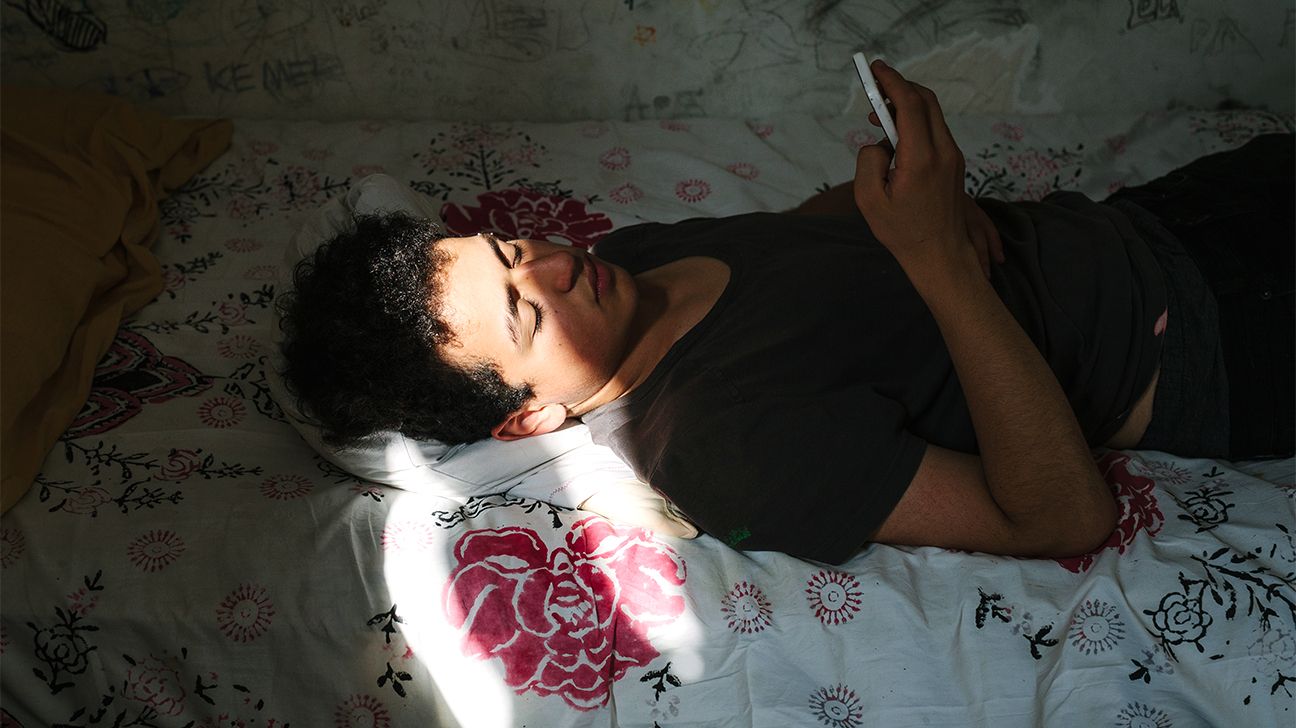Ever wake up to a text you don’t remember sending? If you can’t blame it on the alcohol, and you’re pretty sure it wasn’t sent by a ghost, it was probably just a sleepy version of yourself.
It might seem strange, but sleep texting is a real thing! Here’s what you need to know if it’s happening to you.
Sleep texting is usually triggered by a phone message alert, and your brain reacts the same way it would when you’re awake. It stems from something called parasomnias.
Parasomnias are sleep disorders that can be disruptive when you’re in REM (rapid eye movement) or NREM (non-rapid eye movement) sleep modes. Other parasomnias include sleepwalking and talking, night terrors, and even sleep paralysis.
Unless someone lets you know about your sleepwalking or talking shenanigans, you may never know. Sleep texting is different because the proof is right on your screen the next morning.
There are a handful of things that can cause this type of parasomnia.
Stress
A bad sleep sesh raises your chances of sending an unwanted middle-of-the-night text. Stress (at work, home, you name it) can really screw with your sleep quality.
A 2017 study on medical students found that stress and poor quality of sleep were linked. Students with a relatively low GPA were four times more likely to have poor sleep quality than students with higher GPAs.
Interrupted or little sleep
Your whole body is affected by a lack of sleep or interrupted sleep, but your brain takes the hardest hit. If you’re not getting the recommended 7 to 9 hours of sleep each night, it could be messing with your brain.
A 2016 study found that sleep deprivation affected the brain’s resting-state networks. This can affect attention, motivation, emotion, learning, and memory.
Changes in your sleep schedule
Maybe your hours at work shifted or you’re dealing with a new time zone. Either way, your sleep schedule is about to get a big wakeup call. A change in Mr. Sandman’s delivery route can confuse your circadian rhythm, which is basically your internal alarm clock.
Altering this rhythm can affect your sleep, and therefore your brain function, until your body gets used to the new schedule. To help shift your rhythm, dim the lights when you’re prepping for sleep, then turn on the bright lights when it’s time to wake up.
Fever
Elevated body temperature can wreak havoc on your cognition, sleep, and mood.
A 2014 study investigated sleep patterns and disturbances in children with familial Mediterranean fever (FMF). The children with FMF experienced a lot more parasomnias than the control group.
Genetics
The predisposition for parasomnias could be hanging out in your genes. You have an increased chance of having parasomnias if it runs in your family. Maybe you even sleep text each other! 😉
Underlying conditions
It’s possible that a more serious underlying condition is causing your sleep texting. This is especially true if it’s paired with other parasomnias. If your sleep routine seems consistent and the sleep texting continues, consult with your doc.
Other potential health factors
Some conditions that can contribute to parasomnias include:
- sleep breathing disorders like obstructive sleep apnea
- certain medications, especially antipsychotics or antidepressants
- substance use, including alcohol and drugs
- certain health conditions that disrupt your sleep, such as GERD or restless leg syndrome
Sleep texting happens when you’re asleep (obvi). If you sleep with your phone nearby and hear a notification, your brain might go into autopilot and respond. But it can still happen even if your phone doesn’t make a peep.
Texting is such a normal part of life that it’s become second nature. It’s possible to compose a message without being prompted. Dreams of texting or using your phone could also make you subconsciously send a text in the middle of the night.
Even though it’s not a dangerous condition, sleep texting can be embarrassing or annoying. Here are some strategies to get the sleep texting to stop:
- Turn off your phone when you go to bed.
- Set your phone to “do not disturb.”
- Make sure your notifications are off.
- Put your phone in a different room if you feel tempted to check it.
- Lay off screens an hour before you lay your head to rest.
All of these tips are beneficial, even if you’re not sleep texting. A lot of peeps check their feeds before hitting the hay, but a 2013 study showed that this can lead to sleep issues and less than refreshing rest.
If you’ve been texting in your sleep, a few small adjustments to your routine could make your sleep texting stop completely. Make sure to mute your notifications before drifting off to dreamland or turn your phone off entirely to keep your brain happy.
If these tips aren’t doing the trick, check with your doc in case there are more serious issues at play.


